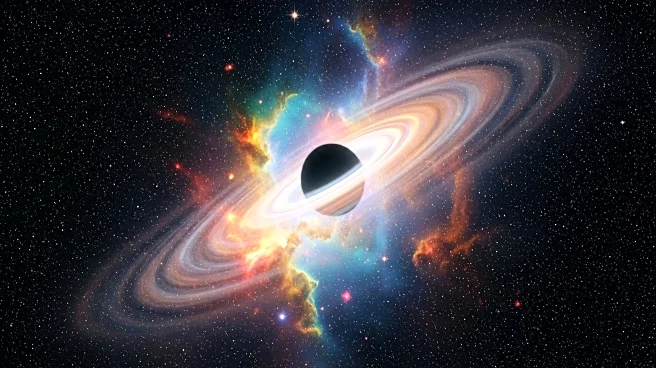What is the story about?
What's Happening?
Astronomers have discovered a distant quasar, RACS J0320-35, that challenges existing theories of black hole growth. This quasar is growing at 2.4 times the Eddington limit, consuming massive amounts of matter equivalent to 300 to 3,000 suns annually. The discovery was made using the Australian Square Kilometre Array Pathfinder and confirmed by telescopes in Chile. The quasar's rapid growth rate and brightness in X-rays have prompted a re-evaluation of existing theories. Traditionally, black hole growth is limited by the Eddington limit, which balances gravitational pull and radiation push. However, RACS J0320-35 defies this cap, marking the fastest growth rate recorded for a black hole in the universe's infancy.
Why It's Important?
The discovery of RACS J0320-35 has significant implications for understanding the early universe's evolution. It suggests that conditions in the early universe might have been more conducive to black hole growth than previously assumed. This challenges the notion that early black holes could only reach a billion solar masses if born massive from giant gas clouds. The findings could reshape theories on black hole formation and cosmic evolution, offering new insights into the universe's history.
What's Next?
Future research aims to explore similar phenomena to refine cosmic evolution theories. Scientists are interested in determining whether RACS J0320-35's growth is a sustained process or a short-lived phase. The relationship between its rapid growth and the production of powerful jets remains a topic of interest. Researchers will continue to seek out more such quasars using advanced telescopes and observatories to further understand these cosmic phenomena.
Beyond the Headlines
The discovery underscores the necessity of re-evaluating our understanding of massive object formation and growth. It opens up new possibilities for understanding black hole genesis and the conditions that allow for rapid accretion rates. The insights gained from studying RACS J0320-35 could potentially unlock new chapters in cosmic history, offering a more comprehensive picture of the universe's evolution.















